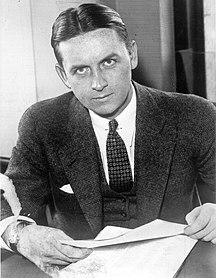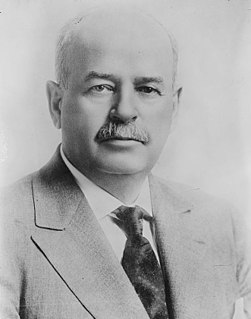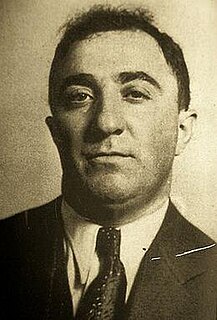
Alphonse Gabriel Capone was an American gangster and businessman who attained notoriety during the Prohibition era as the co-founder and boss of the Chicago Outfit. His seven-year reign as crime boss ended when he went to prison at age 33.

The Saint Valentine's Day Massacre was the 1929 murder of seven members and associates of Chicago's North Side Gang that occurred on Saint Valentine's Day. The men were gathered at a Lincoln Park garage on the morning of that feast day. They were lined up against a wall and shot by four unknown assailants who were dressed like police officers. The incident resulted from the struggle to control organized crime in the city during Prohibition between the Irish North Siders, headed by George "Bugs" Moran, and their Italian South Side Gang rivals led by Al Capone. The perpetrators have never been conclusively identified, but former members of the Egan's Rats gang working for Capone are suspected of a significant role, as are members of the Chicago Police Department who allegedly wanted revenge for the killing of a police officer's son.

Scarface is a 1932 American pre-Code gangster film directed by Howard Hawks and produced by Hawks and Howard Hughes. The screenplay, by Ben Hecht, is based loosely on the 1929 novel by Armitage Trail which was inspired by Al Capone. The film stars Paul Muni as Antonio "Tony" Camonte, a gangster who violently rises through the Chicago gangland. Meanwhile, Camonte pursues his bosses' mistress as Camonte's sister pursues his best hitman. In an overt tie to the life of Capone, one scene depicts a version of the Saint Valentine's Day Massacre.

Eliot Ness was an American Prohibition agent, famous for his efforts to bring down Al Capone and enforce Prohibition in Chicago, Illinois, and the leader of a famous team of law enforcement agents from Chicago, nicknamed The Untouchables. His co-authorship of a popular autobiography, The Untouchables, which was released shortly after his death, launched several television and motion picture portrayals that established Ness's posthumous fame as an incorruptible crime fighter.
A gangster is a criminal who is a member of a gang. Some gangs are considered to be part of organized crime. Gangsters are also called mobsters, a term derived from mob and the suffix -ster. Gangs provide a level of organization and resources that support much larger and more complex criminal transactions than an individual criminal could achieve. Gangsters have been active for many years in countries around the world. Gangsters are the subject of many novels, films, and video games.

John Donato Torrio was an Italian American mobster who helped to build a criminal organization, the Chicago Outfit, in the 1920s; it was later inherited by his protégé, Al Capone. He also put forth the idea of the National Crime Syndicate in the 1930s and later became an unofficial adviser to Lucky Luciano and his Luciano crime family.

Earl J. "Hymie" Weiss, was a Polish-American mob boss who became a leader of the Prohibition-era North Side Gang and a bitter rival of Al Capone. He was known as 'the only man Al Capone feared'.

Francesco Ioele, better known as Frankie Uale or Frankie Yale, was an American gangster based in Brooklyn and second employer of Al Capone.

Frank Nitti was an Italian-born American gangster in Chicago. One of Al Capone's top henchmen, Nitti was in charge of all money flowing through the operation. Nitti later succeeded Capone as boss of the Chicago Outfit.

The Chicago Outfit is an Italian-American organized crime syndicate based in Chicago, Illinois, which dates from the 1910s. It is part of the American Mafia originating in South Side, Chicago.

Lennington "Len" Small was an American politician. He served as the 26th Governor of Illinois, from 1921 to 1929. He also served as a member of the Illinois state senate from the 16th District from 1901 to 1903 and was Illinois state treasurer, from 1905 to 1907, and from 1917 to 1919.
The Atlantic City Conference held between 13–16 May 1929 was a historic summit of leaders of organized crime in the United States. It is considered by most crime historians to be the earliest organized crime summit held in the US. The conference had a major impact on the future direction of the criminal underworld and it held more importance and significance than the Havana Conference of 1946 and the Apalachin meeting of 1957. It also represented the first concrete move toward a National Crime Syndicate.
Salvatore Joseph "Sam" Battaglia was an American mobster and high-level member of the Chicago Outfit criminal organization.

Louis "Little New York" Campagna was an American gangster and mobster and a high-ranking member of the Chicago Outfit for over three decades.
Salvatore "Frank" Capone was an Italian-American Chicago mobster who participated in the attempted takeover of Cicero, Illinois by Chicago Outfit. He worked in the businesses with his brothers Al Capone and Ralph Capone.
Ralph James Capone was an Italian-American Chicago mobster and an older brother of Al Capone and Frank Capone. He got the nickname "Bottles" not from involvement in the Capone bootlegging empire, but from his running the legitimate non-alcoholic beverage and bottling operations in Chicago. Further family lore suggests that the nickname was specifically tied to his lobbying the Illinois Legislature to put into law that milk bottling companies had to stamp the date that the milk was bottled on the bottle. He was most famous for being named by the Chicago Crime Commission "Public Enemy Number Three" when his brother Al was "Public Enemy Number One".
Claude "Screwy" Maddox, born John Edward Moore, was a Chicago mobster and head of the Circus Cafe Gang whose ranks included future Chicago mobsters Anthony "Tough Tony" Capezio, Vincenzo De Mora and Antonino "Tony" "Joe Batters" Accardo.
Schofield's Flowers was a Chicago flower shop that was in business from 1896 to 1976. In its heyday it provided flowers to some of Chicago's most prominent and infamous citizens.